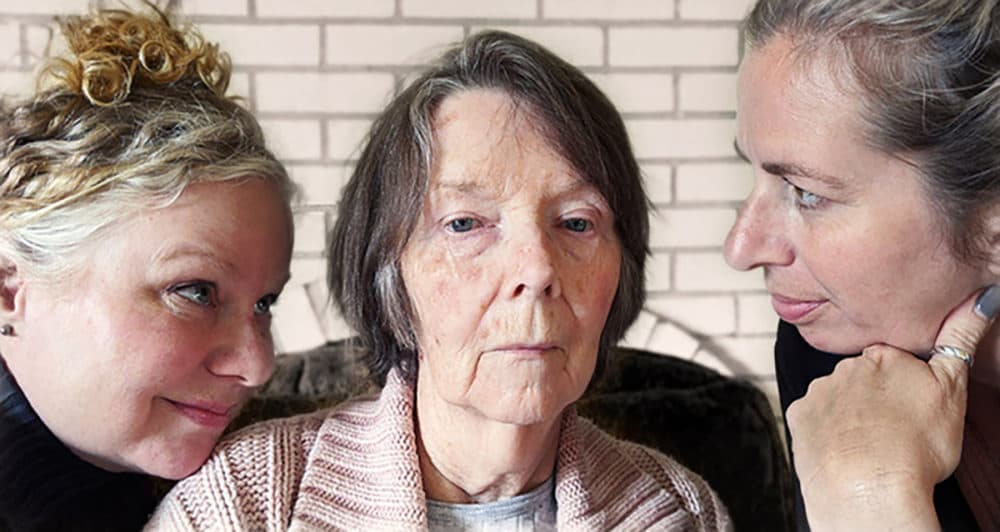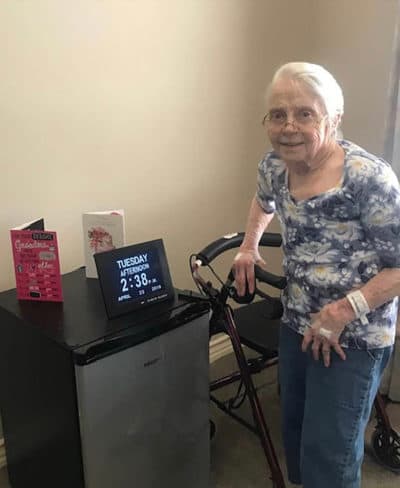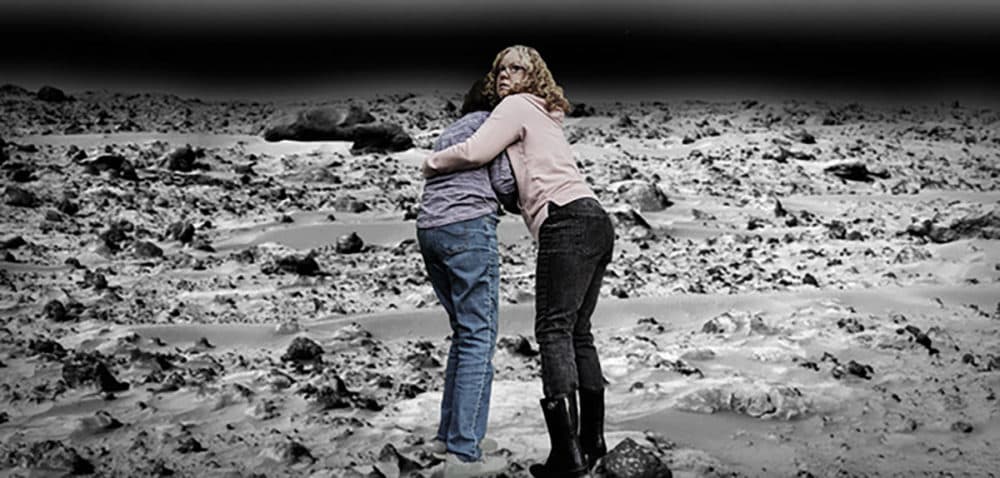Advertisement
COVID-19 Takes Heavy Toll On People With Dementia — Even Those Who Survive
Resume
In a wing for suspected coronavirus patients in a southern California hospital, 81-year-old Judy Putnam was alone and disoriented.
She went into the hospital for a routine kidney stent replacement. Two caregivers in her nursing home already tested positive for the coronavirus, but no one suspected Putnam was sick, perhaps because she already had chronic lung disease and advanced dementia.
Her daughter, Jen Jackson, says Putnam – a short and fiery woman who had spent her whole career helping others – could still hold a conversation, but she couldn’t tell you what happened an hour ago, or that she was experiencing the early symptoms of COVID-19. But her usual doctors caught on.
“They were used to seeing her every three months in her normal state,” says Jackson. “And they sensed that something was wrong.”
They saw pneumonia on a chest x-ray. Then the COVID-19 test came back positive.
Before the pandemic, Putnam would get a “sitter” whenever she was in the hospital, a caregiver that stays with a dementia patient to remind them where they are and what’s happening. But hospital restrictions meant, this time, Putnam was alone.
“She was pulling out IVs, she was pulling off her oxygen mask,” Jen says. “They couldn't sedate her because that would have suppressed her respiration.”
The nurses put a pair of soft restraints on Putnam.
“The hardest thing was knowing that she was very unsettled, very agitated,” says Jackson. “She didn't understand at all what was going on. And to have to be restrained? It just was heartbreaking.”
'You Hope They Have The Closure They Need'
Jackson is one of thousands of families who have learned how terrifying — and dangerous — the coronavirus can be for a loved one with dementia.
Old age, underlying conditions and cognitive decline all put dementia patients at high risk of the virus. In England and Wales, a quarter of the people who died from COVID-19 in April had dementia. There’s no nationwide data on cases and deaths among people with dementia in the U.S. But dementia patients make up more than half of the populations of long-term care homes, where at least 28,000 residents and staff — and likely more — have died of the virus, according to data from The New York Times.
For those people with dementia who remain healthy, the pandemic has disrupted routines and separated them from their loved ones. But for dementia patients who contract the virus — and for loved ones like Jackson — the coronavirus can be especially devastating.
“With a non-dementia loved one who has COVID-19, at least, you might be able to communicate a bit, say what you need to say to them” Jackson says. “With somebody with dementia, you just don't know. You hope that they have the closure that they need, but you can't have the closure that you want to have at all.”

Ten days after she was admitted and without speaking a single coherent sentence in that time, Jackson’s mom died. Jackson and her son, like so many other families, held a Zoom memorial.
Jason Karlawish, a geriatrician at the University of Pennsylvania, says there are a number of reasons why the coronavirus could be more dangerous for dementia patients, even compared to their cognitively-sound counterparts in the same age group.
“When the overall brain is beginning to fail, the body in general seems to be less able to have a full ability to respond and recover to an illness,” he says, though he adds that researchers still haven’t fully determined what’s behind that connection.
There may also be a genetic factor. A recent study from the University of Exeter and the University of Connecticut shows that people with the APOE e4e4 gene variant, which is closely linked to Alzheimer’s, had a higher risk of contracting severe COVID-19.
“It is not just age. This is an example of a specific gene variant causing vulnerability in some people,” David Melzer, a professor at Exeter and a co-author of the study, told The Guardian.
Many people with dementia who fall ill also can’t express their symptoms, and early coronavirus markers may look similar to their other pre-existing conditions. That means the illness can go undiagnosed in the early stages, until someone — like Putnam’s doctors — notices what could be very subtle changes in a patient’s behavior.
Then there’s delirium, or as Karlawish puts it, “The most common medical complication you don’t know about.”
The Danger Of Delirium
Delirium is a temporary change in behavior that’s caused by an acute illness. Over the course of days, or even hours, a patient might become lethargic with slowed speech. Or they might get agitated, aggressive, even violent — like Putnam’s distress in the hospital.
“If you put delirium into an acute illness experience, it's notorious for extending the time of recovery, complicating recovery, and, frankly, increasing the risk of death,” Karlawish says.
In an intensive care unit, Karlawish says, delirium is the norm: 80% of patients on a ventilator will develop delirium, whether they’re elderly and frail, or in their mid-30s with no preexisting conditions.
But the odds of developing delirium skyrocket for patients with dementia, even if those patients never see the inside of an ICU. Several studies show dementia is the single biggest risk factor for delirium, though old age and other pre-existing conditions also play a role.
There are effective ways to fight delirium, but most rely on human contact: A sitter who keeps reorienting the patient or family members who visit. Under current hospital regulations, those interventions have become all but impossible.
Karlawish says hospitals should start thinking about allowing caregivers inside with dementia patients. He points out that hospitals still allow one parent to accompany a child admitted with COVID-19.
“A parent is an extension of the child's mind,” he says. “They fill in where the child can’t. I would argue we should see people with dementia in a similar way.”
Sharon K. Inouye, a geriatrician at Hebrew SeniorLife and professor at Harvard University, agrees. He wrote in The New York Times urging hospitals to combat what he calls “delirium epidemic.”
“Family caregivers for patients with or at risk for delirium (those with dementia, for example) shouldn’t be classified as ‘visitors’ — they are essential care providers,” he wrote. “They should be provided protective equipment and training, and allowed in the rooms.”
'A Lot Less Of My Mom'
But even surviving the coronavirus — and a battle with delirium — isn’t the end.
Studies show that delirium, while temporary, can actually speed up permanent cognitive deterioration. A single episode of delirium can basically hit fast-forward on dementia.
“[Delirium] also increases the likelihood, if you recover, of never going back to the way you were before, cognitively,” Karlawish says.
For Kitty Norton of Portland, Oregon, that’s nothing new.
She’s been a full-time caregiver for her mom, Gloria Norton, for years. She says illnesses and even life events — dad’s death one year, a bad flu another — have always seemed to speed up her mom’s dementia.
"Any major event just makes dementia jump ahead by leaps and bounds,” she says.
Taking care of her mom as dementia progresses is a full-time job. But her sister takes over a few days each week, and they’ve hired a part-time aide. Before the pandemic closed most businesses, the sisters had located a respite center where they could send mom for a few hours each day.

And, Norton says, they always managed to find the joy.
“When it comes to dementia, we have kind of a different take on it in this household,” she says. “I wish mom wasn't dying of dementia, but that's our reality. And I can't live in despair. I'm not built that way.”
It doesn’t hurt that her mom passed on a sense of humor, Norton says.
“Mom walks out of the bedroom with two different shoes on and, you know, her underwear over her shirt,” she says. “You just take a picture and laugh and send it to your sister, and go, ‘Oh brother, look what our fashionista is doing today!’”
Pre-COVID-19, Norton says, her mom couldn’t verbalize much anymore but she would laugh a lot. She got a kick out of burps and curse words. Physically, she was in good shape: Her daughters tried to get her on hospice care, but she was too healthy to qualify.
Norton documented her mom’s state of mind, and the family’s ups and downs, on her blog, Stumped Town Dementia.
When her mom caught the coronavirus in mid-March, she wrote about that too.
“Mom's normal sniffles and cough for the season started to get very severe,” Norton says. “We kept an eye on it for a couple of days. And then her fever spiked.”
They still don’t know how the coronavirus got in the house, but a drive-thru COVID-19 test came back positive. For two weeks, Norton’s mother fought the virus. There were violent fits of coughing that brought her to tears. But mostly, she slept, which experts say is another way that delirium can manifest during an illness.
Norton says, sometimes, watching her mom sleep, chest barely rising and falling with shallow breaths, she was sure her mom wouldn’t survive.
And yet, a few weeks later, Gloria Norton was virus-free. She had recovered from COVID-19.
But the illness had already taken its toll.
“Before COVID-19, there was a lot more alertness to her,” Norton says. “There were more smiles. A lot less of my mom, my mom that I knew a month ago, is here.”
Even after the disease passed, her mom still slept more and ate less. She became unsteady on her feet. Her blood pressure would plunge suddenly, dropping her to the floor. After the first fall, she finally qualified for hospice care.
“Dementia's just zooming right along, it left COVID-19 in the dust,” Norton says. But she laughs, too. The Norton household is still finding ways to make the best of things, she says, and to make each other giggle. For her, it’s all about perspective.
“You know, mom was really different when she was two years old,” she says. “Mom was really different a decade ago. This is mom’s entire life, and this death part is also her life. She's mom until she takes her last breath and then she's mom somewhere else.”
So, Norton says, she’s adjusting to the new mom. The mom she knows and loves, right now.
This segment aired on May 29, 2020.
